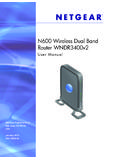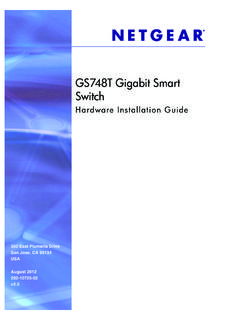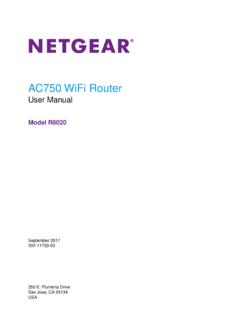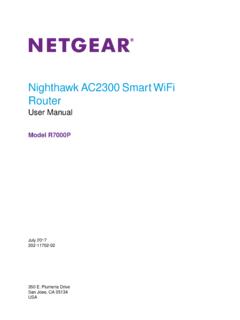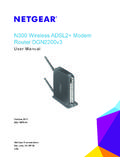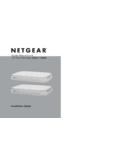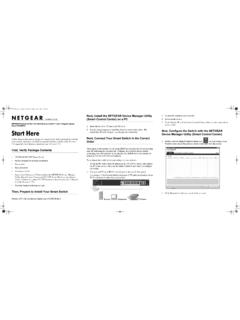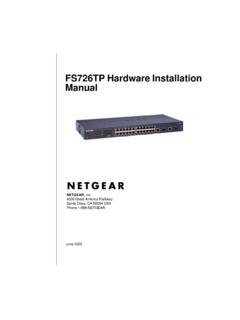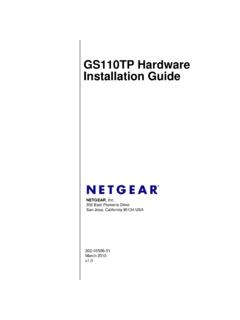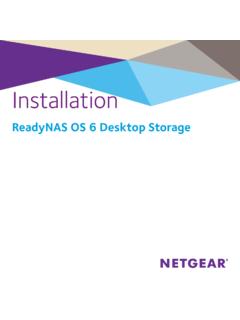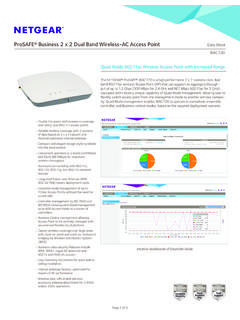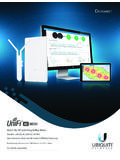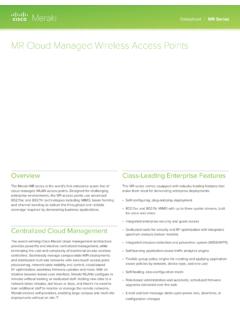Transcription of R6300 WiFi Router 802.11ac Dual Band Gigabit User Manual
1 R6300 WiFi Router dual band Gigabit user M anual 350 East Plumeria Drive San Jose, CA 95134. USA. June 2012. 202-11030-01. R6300 WiFi Router dual band Gigabit 2012 NETGEAR, Inc. All rights reserved. No part of this publication may be reproduced, transmitted, transcribed, stored in a retrieval system, or translated into any language in any form or by any means without the written permission of NETGEAR, Inc. Technical Support Thank you for choosing NETGEAR. To register your product, get the latest product updates, or get support online, visit us at Phone (US & Canada only): 1-888-NETGEAR. Phone (Other Countries): See Support information card. Trademarks NETGEAR, the NETGEAR logo, and Connect with Innovation are trademarks and/or registered trademarks of NETGEAR, Inc. and/or its subsidiaries in the United States and/or other countries. Information is subject to change without notice.
2 Other brand and product names are registered trademarks or trademarks of their respective holders. 2011 NETGEAR, Inc. All rights reserved. Statement of Conditions To improve internal design, operational function, and/or reliability, NETGEAR reserves the right to make changes to the products described in this document without notice. NETGEAR does not assume any liability that may occur due to the use, or application of, the product(s) or circuit layout(s) described herein. 2. Contents Chapter 1 Hardware Setup Unpack Your Router .. 8. Position Your Router .. 8. Hardware Features.. 9. Front and Side Panel .. 9. Back Panel .. 10. Label.. 11. Chapter 2 Getting Started with NETGEAR Genie Router Setup Preparation.. 13. Use Standard TCP/IP Properties for DHCP .. 13. Gather ISP Information.. 13. Wireless Devices and Security Settings .. 13. Types of Logins and Access.
3 13. NETGEAR Genie Setup .. 14. Use NETGEAR Genie after Installation .. 15. Upgrade Router Firmware .. 15. Router Dashboard (Basic Home Screen) .. 16. Add Wireless Devices or Computers to Your Network .. 17. Manual Method.. 17. Wi-Fi Protected Setup (WPS) Method .. 17. Chapter 3 Genie Basic Settings Internet Setup .. 19. Internet Setup Screen Fields .. 19. Attached Devices .. 21. Parental Controls .. 22. ReadySHARE USB Storage.. 24. Basic Wireless Settings .. 25. Wireless Settings Screen Fields.. 26. Change WPA Security Option and Passphrase .. 27. Guest Networks .. 28. Guest Network Wireless Security Options .. 29. Chapter 4 Genie Advanced Home Setup Wizard .. 31. WPS Wizard .. 32. Setup Menu .. 33. 3. R6300 WiFi Router dual band Gigabit WAN Setup.. 34. Default DMZ Server .. 35. Change the MTU Size .. 35. LAN Setup .. 37. LAN Setup Screen Settings .. 38.
4 Use the Router as a DHCP Server.. 38. Address Reservation .. 39. Quality of Service (QoS) Setup .. 40. Chapter 5 USB Storage USB Drive Requirements .. 46. ReadySHARE Access .. 46. File-Sharing Scenarios .. 46. Basic Settings.. 48. Add or Edit a Network Folder .. 49. USB Storage Advanced Settings .. 50. Safely Remove a USB Drive .. 51. Media Server Settings .. 52. Specify Approved USB Devices .. 52. Connect to the USB Drive from a Remote Computer.. 54. Access the Router 's USB Drive Remotely Using FTP .. 54. Chapter 6 ReadySHARE Printer ReadySHARE Printer .. 56. USB Control Center Utility .. 61. Control Center Configuration .. 62. USB Printer.. 62. Scan with a Multi-Function Printer .. 63. Desktop NETGEAR Genie .. 64. Chapter 7 Security Keyword Blocking of HTTP Traffic .. 66. Block Services (Port Filtering) .. 67. Schedule Blocking .. 69. Security Event Email Notifications.
5 70. Chapter 8 Administration Upgrade the Router Firmware .. 72. View Router Status.. 73. Router Information .. 73. Internet Provider (WAN) Setup.. 73. Wireless Settings ( GHz and 5 GHz) .. 76. View Logs of Web Access or Attempted Web Access .. 77. Manage the Configuration File .. 78. Back Up Settings .. 78. 4. R6300 WiFi Router dual band Gigabit Restore Configuration Settings..78. Erase .. 79. Set Password .. 79. Password Recovery ..79. Chapter 9 Advanced Settings Advanced Wireless Settings..82. Set Up the Router in Bridge Mode ..83. Wireless Repeating Function (WDS) ..85. Wireless Repeating Function ..86. Set Up the Base Station ..87. Set Up a Repeater Unit..88. Port Forwarding and Triggering ..88. Remote Computer Access Basics ..89. Port Triggering to Open Incoming Ports ..90. Port Forwarding to Permit External Host Communications ..91. How Port Forwarding Differs from Port Triggering.
6 92. Set Up Port Forwarding to Local Servers ..92. Add a Custom Service ..93. Editing or Deleting a Port Forwarding Entry ..94. Set Up Port Triggering ..95. Dynamic DNS .. 97. Static Routes .. 99. Remote Management ..101. USB Settings .. 102. Universal Plug and Play ..102. IPv6 .. 103. Traffic Meter .. 104. Chapter 10 Troubleshooting Quick Tips.. 107. Sequence to Restart Your Network ..107. Check Ethernet Cable Connections ..107. Wireless Settings ..107. Network Settings..107. Troubleshooting with the LEDs..108. Power/Test LED Is Off or Blinking ..108. Power/Test LED Stays Amber ..108. LEDs Never Turn Off ..109. Internet or Ethernet Port LEDs Are Off ..109. Wireless LEDs Are Off ..109. The Push 'N' Connect (WPS) Button Blinks Amber ..109. Cannot Log In to the Router ..110. Cannot Access the Internet ..110. Troubleshooting PPPoE ..112. Troubleshooting Internet Browsing.
7 112. Changes Not Saved ..113. 5. R6300 WiFi Router dual band Gigabit Wireless Connectivity .. 113. Wireless Signal Strength .. 113. Restore the Factory Settings and Password .. 113. Troubleshoot Your Network Using the Ping Utility .. 114. Test the LAN Path to Your Router .. 114. Test the Path from Your Computer to a Remote Device .. 115. Appendix A Supplemental Information Factory Settings .. 116. Technical Specifications.. 118. Appendix B Notification of Compliance Index 6. Hardware Setup 1. Get ti ng to know your Router 1. The NETGEAR R6300 WiFi Router delivers next generation WiFi at Gigabit speeds. It offers the ultimate mobility for WiFi devices with speeds up to 3x faster than Compatible with next generation WiFi devices, and backward compatible with a/b/g and n devices, it enables HD streaming throughout your home. The R6300 with simultaneous dual band WiFi technology offers speeds up to 4501 to 13002 Mbps and avoids interference, ensuring top WiFi speeds and reliable connections.
8 This makes it ideal for larger homes with multiple devices. In addition, four Gigabit Ethernet ports offer ultra-fast wired connections. Wirelessly access and share a USB hard drive and USB printer using the two USB ports. If you already set up your Router , you can skip this chapter. If you have not done that yet, this chapter covers the hardware setup. Chapter 3, Genie Basic Settings, explains how to set up your Internet connection. This chapter contains the following sections: Unpack Your Router Position Your Router Hardware Features For information about ReadySHARE features in your product, see Chapter 5, USB Storage, and The NETGEAR genie app provides easy installation from an iPad , tablet, computer or smartphone. It includes a personal dashboard, allowing you to manage, monitor, and repair your home network. NETGEAR customers can download the app at or from the Google Play or App Store.
9 For more information about the topics covered in this Manual , visit the Support website at 1. Maximum wireless signal rate derived from IEEE standard specifications. Actual data throughput and wireless coverage will vary. Network conditions and environmental factors, including volume of network traffic, building materials and construction, and network overhead, lower actual data throughput rate and wireless coverage. NETGEAR makes no express or implied representations or warranties about this product's compatibility with any future standards. 1300 Mbps is approximately 3x faster than 450 Mbps. 2. Up to 1300 Mbps wireless speeds achieved when connecting to other 1300 Mbps devices. 7. R6300 WiFi Router dual band Gigabit Unpack Your Router Open the box and remove the Router , cables, and installation guide. Ethernet cable Power adapter dual band WiFi Router Power cord Figure 1.
10 Check the package contents Your box contains the following items: R6300 WiFi Router dual band Gigabit AC power adapter and power cord (plug varies by region). Category 5 (Cat 5) Ethernet cable Installation guide with cabling and Router setup instructions If any parts are incorrect, missing, or damaged, contact your NETGEAR dealer. Keep the carton and original packing materials, in case you need to return the product for repair. Position Your Router The Router lets you access your network from virtually anywhere within the operating range of your wireless network. However, the operating distance or range of your wireless connection can vary significantly depending on the physical placement of your Router . For example, the thickness and number of walls the wireless signal passes through can limit the range. For best results, place your Router : Near the center of the area where your computers and other devices operate, and preferably within line of sight to your wireless devices.
